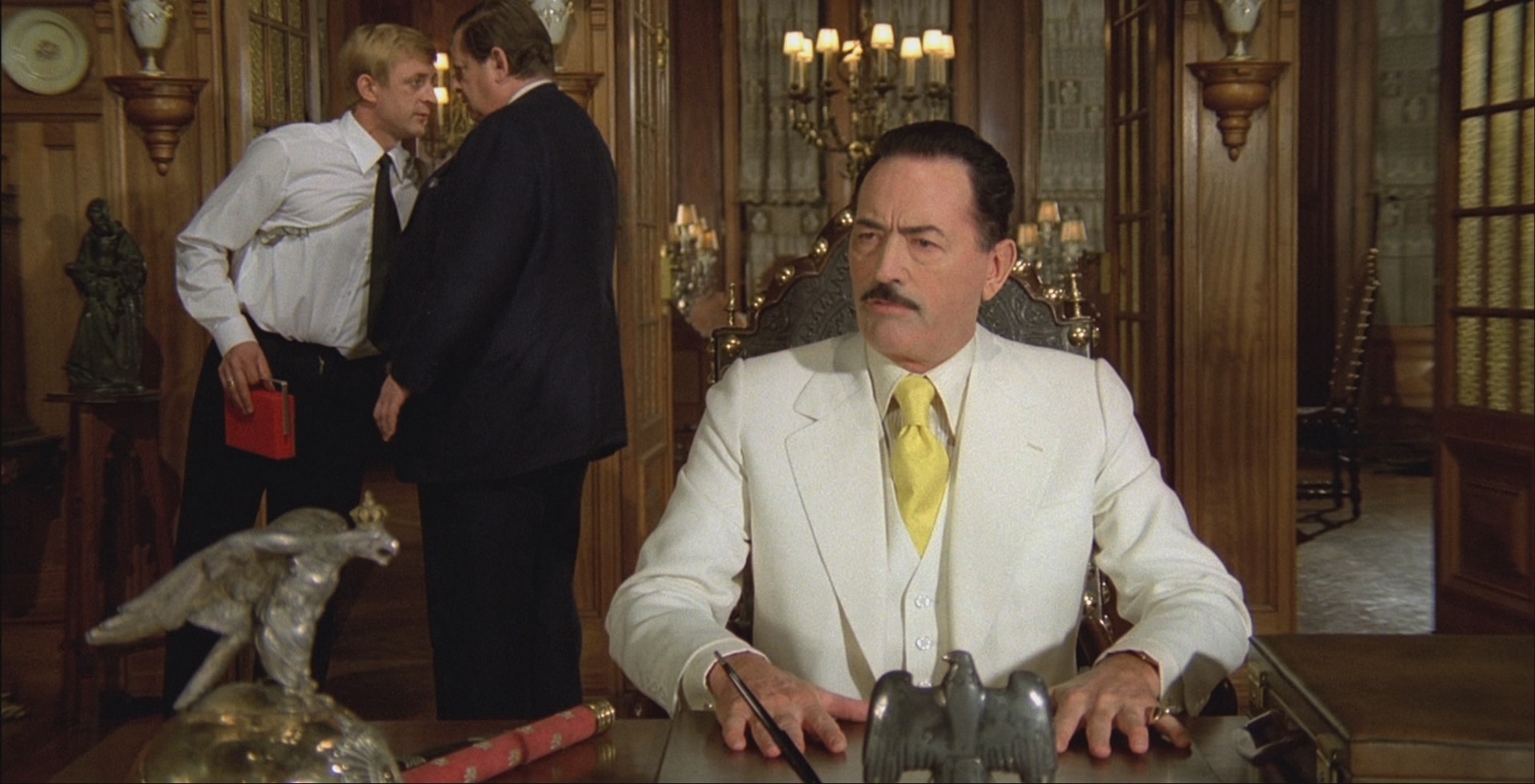General Discussion
Related: Editorials & Other Articles, Issue Forums, Alliance Forums, Region ForumsJeb Bush says “you gotta step up” and kill baby Hitler
Dylan Matthews
Vox.com on November 9, 2015, 3:20 p.m. ET
So this is the world we live in now. Asked by the Huffington Post whether he would go back in time and kill baby Hitler, Jeb Bush said, "Hell yeah, I would! You gotta step up, man."
But do you? Should you?

CONTINUED...
http://www.vox.com/2015/11/9/9698394/jeb-bush-killing-baby-hitler
MrWendel
(1,881 posts)of circumstance, how they grew up, and who they meet along the way. People aren't born evil.... most people.
Octafish
(55,745 posts)It all depends on how we are raised and how we react to the events in our lives.
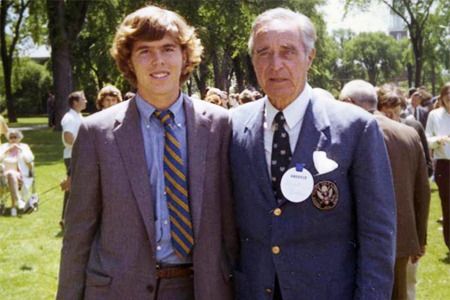
While we all are human and capable of both good and evil, usually one side wins out.
MohRokTah
(15,429 posts)The moment he kills baby Hitler, he has created a divergent timeline and would no longer exist in or be capable of returning to our timeline, resolving the issue of Jeb! existing here.
This is the only way to resolve the inherent paradox of altering that which has already happened.
Response to MohRokTah (Reply #2)
MrWendel This message was self-deleted by its author.
Initech
(100,076 posts)MrWendel
(1,881 posts)tblue37
(65,358 posts)BlueStater
(7,596 posts)Jeb is just too dumb not to take the bait.
Octafish
(55,745 posts)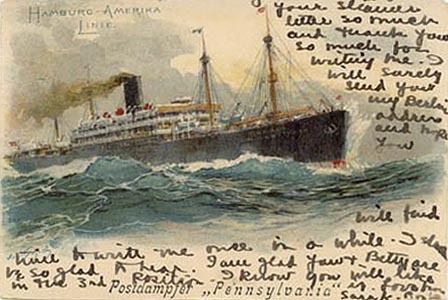
How Bush's grandfather helped Hitler's rise to power
Rumours of a link between the US first family and the Nazi war machine have circulated for decades. Now the Guardian can reveal how repercussions of events that culminated in action under the Trading with the Enemy Act are still being felt by today's president
Ben Aris in Berlin and Duncan Campbell in Washington
The Guardian, Saturday 25 September 2004
George Bush's grandfather, the late US senator Prescott Bush, was a director and shareholder of companies that profited from their involvement with the financial backers of Nazi Germany. The Guardian has obtained confirmation from newly discovered files in the US National Archives that a firm of which Prescott Bush was a director was involved with the financial architects of Nazism.
His business dealings, which continued until his company's assets were seized in 1942 under the Trading with the Enemy Act, has led more than 60 years later to a civil action for damages being brought in Germany against the Bush family by two former slave labourers at Auschwitz and to a hum of pre-election controversy.
The evidence has also prompted one former US Nazi war crimes prosecutor to argue that the late senator's action should have been grounds for prosecution for giving aid and comfort to the enemy.
The debate over Prescott Bush's behaviour has been bubbling under the surface for some time. There has been a steady internet chatter about the "Bush/Nazi" connection, much of it inaccurate and unfair. But the new documents, many of which were only declassified last year, show that even after America had entered the war and when there was already significant information about the Nazis' plans and policies, he worked for and profited from companies closely involved with the very German businesses that financed Hitler's rise to power. It has also been suggested that the money he made from these dealings helped to establish the Bush family fortune and set up its political dynasty.
Remarkably, little of Bush's dealings with Germany has received public scrutiny, partly because of the secret status of the documentation involving him. But now the multibillion dollar legal action for damages by two Holocaust survivors against the Bush family, and the imminent publication of three books on the subject are threatening to make Prescott Bush's business history an uncomfortable issue for his grandson, George W, as he seeks re-election.
CONTINUED...
http://www.theguardian.com/world/2004/sep/25/usa.secondworldwar
RKP5637
(67,108 posts)Angry Dragon
(36,693 posts)tk2kewl
(18,133 posts)
Octafish
(55,745 posts)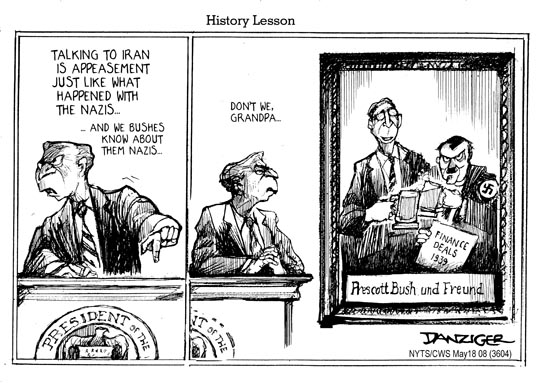
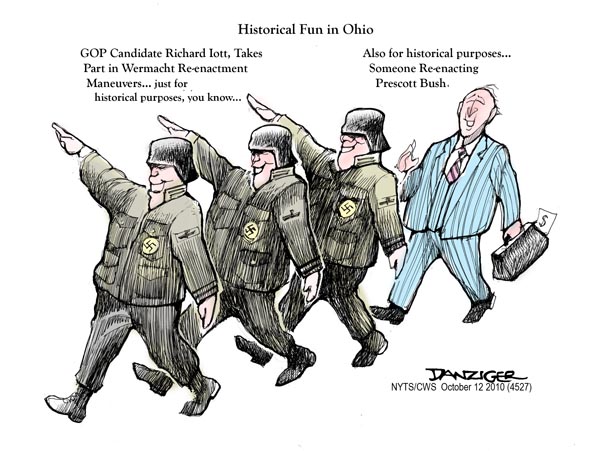
-- James Ridgeway, The Bush Family Fortune, Village Voice
jpak
(41,758 posts)Pro Life?
not
napkinz
(17,199 posts)at then end of the film -- go to 1 hour and 54 minutes into the film -- David Bennett, played by John Rubinstein, says the Hitler clones (all young boys) must be killed.
Ezra Lieberman, played by Laurence Olivier, sets fire to the list, destroying it, so Bennett won't be able to find and kill them.
Octafish
(55,745 posts)jtuck004
(15,882 posts)Octafish
(55,745 posts)Wants to show the Reich he'd be a pretty damn quick decider in life-or-death matters, especially when it's someone else who has to do the dying, a family trait:
New book reveals links of two presidents and the governor of Florida with exiled hardliners
Duncan Campbell in Los Angeles
The Guardian, Dec. 1, 2002
The brother of President George Bush, the Florida governor, Jeb Bush, has been instrumental in securing the release from prison of militant Cuban exiles convicted of terrorist offences, according to a new book. The Bush family has also accommodated the demands of Cuban exile hardliners in exchange for electoral and financial support, the book suggests.
Last year, after September 11, while the justice department announced a sweep of terrorist suspects, Cubans convicted of terrorist offences were being released from US jails with the consent of the Bush administration, according to the book, Cuba Confidential: Love and Vengeance in Miami and Havana, by Ann Louise Bardach, the award-winning investigative journalist who has covered Cuban and Miami politics for the New York Times and Vanity Fair.
The Bush family connections go back to 1984 when Jeb Bush began a close association with Camilo Padreda, a former intelligence officer with the Batista dictatorship overthrown by Fidel Castro.
Jeb Bush was then the chairman of the Dade county Republican party and Padreda its finance chairman. Padreda had earlier been indicted on a $500,000 (£320,000) embezzlement charge along with a fellow exile, Hernandez Cartaya, but the charges were dropped, reportedly after the CIA stated that Cartaya had worked for them.
Padreda later pleaded guilty to defrauding the housing and urban development department of millions of dollars during the 1980s.
The president's younger brother was also on the payroll in the 80s of the prominent Cuban exile Miguel Recarey, who had earlier assisted the CIA in attempts to assassinate President Castro.
Recarey, who ran International Medical Centres (IMC), employed Jeb Bush as a real estate consultant and paid him a $75,000 fee for finding the company a new location, although the move never took place, which raised questions at the time. Jeb Bush did, however, lobby the Reagan/Bush administration vigorously and successfully on behalf of Recarey and IMC. "I want to be very wealthy," Jeb Bush told the Miami News when questioned during that period.
In 1985, Jeb Bush acted as a conduit on behalf of supporters of the Nicaraguan contras with his father, then the vice-president, and helped arrange for IMC to provide free medical treatment for the contras.
CONTINUED...
http://www.theguardian.com/world/2002/dec/02/usa.books
Bush family friends helped bomb innocent people, including a Cuban civilian airliner.
jtuck004
(15,882 posts)Guy Whitey Corngood
(26,501 posts)Octafish
(55,745 posts)
"Todavía no era seguro para hablar sobre mi cabra mascota..."
Initech
(100,076 posts)Fumesucker
(45,851 posts)Hitler was an unmatched orator in his particular time and place, a fairly good politician and a lousy commander in chief/military strategist.
WWII would most likely have happened without Hitler but without him making massive military blunders like Operation Barbarossa Germany would have been in a lot better military position in the latter part of WWII.
God help us, Dubya is the smart one.
Journeyman
(15,031 posts)If I could, I'd travel back in time to months before his birth, to Braunau am Inn, Austria, and once there I'd tinker biologically with Klara Hitler's womb, transform her developing child in the best means possible, so that early on the morning of April 20, 1889 she would give birth to a wonderful human being, a child who would grow to love and appreciate all whom he met, who would develop into a compassionate, empathetic adult, a perfect human being named Adolf Hitler.
That's what I'd do if I could time travel and tinker. There's been enough killing, wouldn't you agree?
Tierra_y_Libertad
(50,414 posts)JEB
(4,748 posts)Warren DeMontague
(80,708 posts)It's sort of like "If you had the chance to kill voldemort in the first Harry Potter book, would you?"
tularetom
(23,664 posts)But really, was it that much worse than the question itself?
MisterP
(23,730 posts)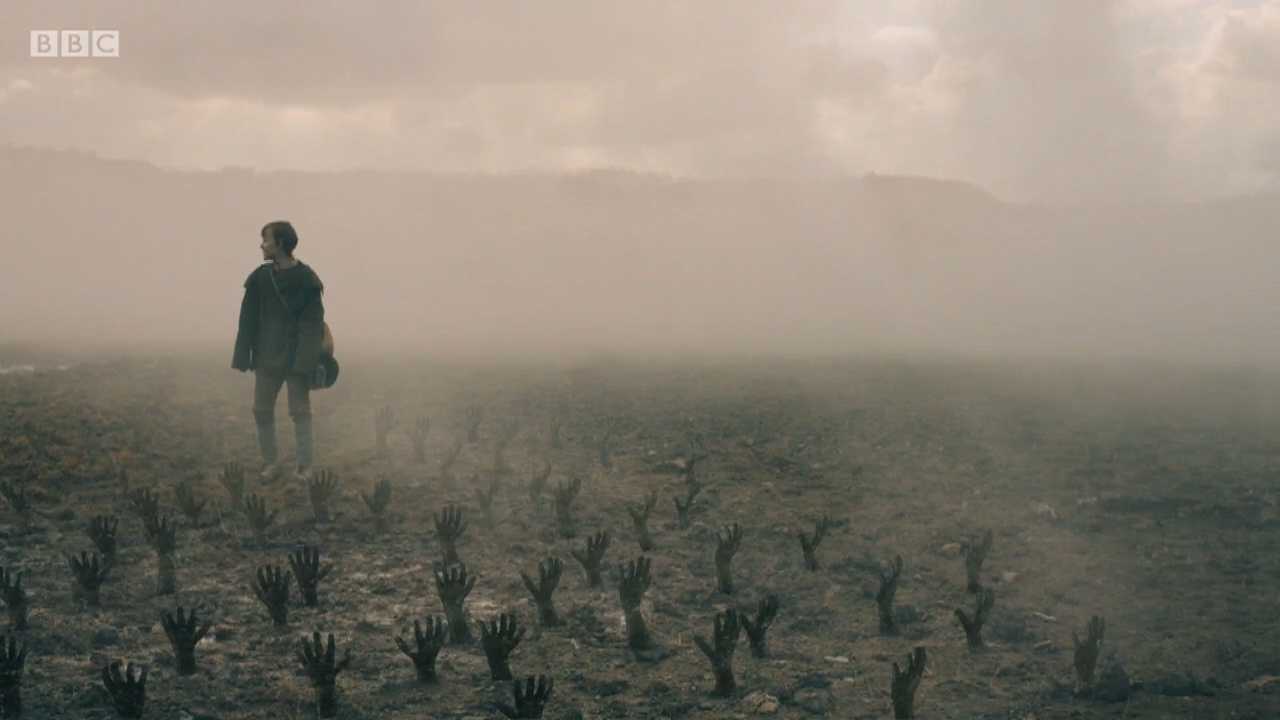
Octafish
(55,745 posts)Who knows? Humanity acts like chattel. Remarkable picture, yours, MisterP. Is it from Dr. Who?

Interesting times, in deed and in fact.
MisterP
(23,730 posts)Generic Brad
(14,275 posts)Had he suggested that then I might believe Jeb can "fix it".
Warren DeMontague
(80,708 posts)
tavernier
(12,388 posts)If I have to explain it then you are truly in a fog.
History will reveal that GWB was Hitler to multiple nations, and opened Pandora's box for lifetimes to come. Your dear old dad might blame Cheney and others, but the buck really did stop with your brother and with your compliance and trickery to get him into the Presidency.
JEB
(4,748 posts)Octafish
(55,745 posts)The Garden of Forking Paths
by Jorge Luis Borges
I
On page 22 of Liddell Hart’s History of World War I you will read that an attack against the Serre-Montauban line by thirteen British divisions (supported by 1,400 artillery pieces), planned for the 24th of July, 1916, had to be postponed until the morning of the 29th. The torrential rains, Captain Liddell Hart comments, caused this delay, an insignificant one, to be sure.
The following statement, dictated, reread and signed by Dr. Yu Tsun, former professor of English at the Hochschule at Tsingtao, throws an unsuspected light over the whole affair. The first two pages of the document are missing.
“. . . and I hung up the receiver. Immediately afterwards, I recognized the voice that had answered in German. It was that of Captain Richard Madden. Madden’s presence in Viktor Runeberg’s apartment meant the end of our anxieties and—but this seemed, or should have seemed, very secondary to me—also the end of our lives. It meant that Runeberg had been arrested or murdered.[1]
Before the sun set on that day, I would encounter the same fate. Madden was implacable. Or rather, he was obliged to be so. An Irishman at the service of England, a man accused of laxity and perhaps of treason, how could he fail to seize and be thankful for such a miraculous opportunity: the discovery, capture, maybe even the death of two agents of the German Reich? I went up to my room; absurdly I locked the door and threw myself on my back on the narrow iron cot. Through the window I saw the familiar roofs and the cloud-shaded six o’clock sun. It seemed incredible to me that day without premonitions or symbols should be the one of my inexorable death. In spite of my dead father, in spite of having been a child in a symmetrical garden of Hai Feng, was I—now—going to die? Then I reflected that everything happens to a man precisely, precisely now. Centuries of centuries and only in the present do things happen; countless men in the air, on the face of the earth and the sea, and all that really is happening is happening to me . . . The almost intolerable recollection of Madden’s horselike face banished these wanderings. In the midst of my hatred and terror (it means nothing to me now to speak of terror, now that I have mocked Richard Madden, now that my throat yearns for the noose) it occurred to me that tumultuous and doubles happy warrior did not suspect that I possessed the Secret. The name of the exact location of the new British artillery park on the River Ancre. A bird streaked across the gray sky and blindly I translated it into an airplane and that airplane into many (against the French sky) annihilating the artillery station with vertical bombs. If only my mouth, before a bullet shattered it, could cry out that secret name so it could be heard in Germany . . . My human voice was very weak. How might I make it carry to the ear of the Chief? To the ear of that sick and hateful man who knew nothing of Runeberg and me save that we were in Staffordshire and who was waiting in vain for our report in his arid office in Berlin, endlessly examining newspapers . . . I said out loud: I must see. I sat up noiselessly, in a useless perfection of silence, as if Madden were already lying in wait for me. Something—perhaps the mere vain ostentation of proving my resources were nil—made me look through my pockets. I found what I knew I would find. The American watch, the nickel chain and the square coin, the key ring with the incriminating useless keys to Runeberg’s apartment, the notebook, a letter which I resolved to destroy immediately (and which I did not destroy), a crown, two shillings and a few pence, the red and blue pencil, the handkerchief, the revolver with one bullet. Absurdly, I took it in my hand and weighed it in order to inspire courage within myself. Vaguely I thought that a pistol report can be heard at a great distance. In ten minutes my plan was perfected. The telephone book listed the name of the only person capable of transmitting the message; he lived in a suburb of Fenton, less than a half hour’s train ride away.
I am a cowardly man. I say it now, now that I have carried to its end a plan whose perilous nature no one can deny. I know its execution was terrible. I didn’t do it for Germany, no. I care nothing for a barbarous country which imposed upon me the abjection of being a spy. Besides, I know of a man from England—a modest man—who for me is no less great than Goethe. I talked with him for scarcely an hour, but during that hour he was Goethe . . . I did it because I sensed that the Chief somehow feared people of my race—for the innumerable ancestors who merge within me. I wanted to prove to him that a yellow man could save his armies. Besides, I had to flee from Captain Madden. His hands and his voice could call at my door at any moment. I dressed silently, bade farewell to myself in the mirror, went downstairs, scrutinized the peaceful street and went out. The station was not far from my home, but I judged it wise to take a cab. I argued that in this way I ran less risk of being recognized; the fact is that in the deserted street I felt myself visible and vulnerable, infinitely so. I remember that I told the cab driver to stop a short distance before the main entrance. I got out with voluntary, almost painful slowness; I was going to the village of Ashgrove but I bought a ticket for a more distant station. The train left within a very few minutes, at eight-fifty. I hurried; the next one would leave at nine-thirty. There was hardly a soul on the platform. I went through the coaches; I remember a few farmers, a woman dressed in mourning, a young boy who was reading with fervor the Annals of Tacitus, a wounded and happy soldier. The coaches jerked forward at last. A man whom I recognized ran in vain to the end of the platform. It was Captain Richard Madden. Shattered, trembling, I shrank into the far corner of the seat, away from the dreaded window.
From this broken state I passed into an almost abject felicity. I told myself that the duel had already begun and that I had won the first encounter by frustrating, even if for forty minutes, even if by a stroke of fate, the attack of my adversary. I argued that this slightest of victories foreshadowed a total victory. I argued (no less fallaciously) that my cowardly felicity proved that I was a man capable of carrying out the adventure successfully. From this weakness I took strength that did not abandon me. I foresee that man will resign himself each day to more atrocious undertakings; soon there will be no one but warriors and brigands; I give them this counsel: The author of an atrocious undertaking ought to imagine that he has already accomplished it, ought to impose upon himself a future as irrevocable as the past. Thus I proceeded as my eyes of a man already dead registered the elapsing of that day, which was perhaps the last, and the diffusion of the night. The train ran gently along, amid ash trees. It stopped, almost in the middle of the fields. No one announced the name of the station. “Ashgrove?” I asked a few lads on the platform. “Ashgrove,” they replied. I got off.
A lamp enlightened the platform but the faces of the boys were in shadow. One questioned me, “Are you going to Dr. Stephen Albert’s house?” Without waiting for my answer, another said, “The house is a long way from here, but you won’t get lost if you take this road to the left and at every crossroads turn again to your left.” I tossed them a coin (my last), descended a few stone steps and started down the solitary road. It went downhill, slowly. It was of elemental earth; overhead the branches were tangled; the low, full moon seemed to accompany me.
For an instant, I thought that Richard Madden in some way had penetrated my desperate plan. Very quickly, I understood that was impossible. The instructions to turn always to the left reminded me that such was the common procedure for discovering the central point of certain labyrinths. I have some understanding of labyrinths: not for nothing am I the great grandson of that Ts’ui Pên who was governor of Yunnan and who renounced worldly power in order to write a novel that might be even more populous than the Hung Lu Meng and to construct a labyrinth in which all men would become lost. Thirteen years he dedicated to these heterogeneous tasks, but the hand of a stranger murdered him—and his novel was incoherent and no one found the labyrinth. Beneath English trees I meditated on that lost maze: I imagined it inviolate and perfect at the secret crest of a mountain; I imagined it erased by rice fields or beneath the water; I imagined it infinite, no longer composed of octagonal kiosks and returning paths, but of rivers and provinces and kingdoms . . . I thought of a labyrinth of labyrinths, of one sinuous spreading labyrinth that would encompass the past and the future and in some way involve the stars. Absorbed in these illusory images, I forgot my destiny of one pursued. I felt myself to be, for an unknown period of time, an abstract perceiver of the world. The vague, living countryside, the moon, the remains of the day worked on me, as well as the slope of the road which eliminated any possibility of weariness. The afternoon was intimate, infinite. The road descended and forked among the now confused meadows. A high-pitched, almost syllabic music approached and receded in the shifting of the wind, dimmed by leaves and distance. I thought that a man can be an enemy of other men, of the moments of other men, but not of a country: not of fireflies, words, gardens, streams of water, sunsets. Thus I arrived before a tall, rusty gate. Between the iron bars I made out a poplar grove and a pavilion. I understood suddenly two things, the first trivial, the second almost unbelievable: the music came from the pavilion, and the music was Chinese. For precisely that reason I had openly accepted it without paying it any heed. I do not remember whether there was a bell or whether I knocked with my hand. The sparkling of the music continued.
From the rear of the house within a lantern approached: a lantern that the trees sometimes striped and sometimes eclipsed, a paper lantern that had the form of a drum and the color of the moon. A tall man bore it. I didn’t see his face for the light blinded me. He opened the door and said slowly, in my own language: “I see that the pious Hsi P’eng persists in correcting my solitude. You no doubt wish to see the garden?”
I recognized the name of one of our consuls and I replied, disconcerted, “The garden?”
“The garden of forking paths.”
Something stirred in my memory and I uttered with incomprehensible certainty, “The garden of my ancestor Ts’ui Pên.”
“Your ancestor? Your illustrious ancestor? Come in.”
The damp path zigzagged like those of my childhood. We came to a library of Eastern and Western books. I recognized bound in yellow silk several volumes of the Lost Encyclopedia, edited by the Third Emperor of the Luminous Dynasty but never printed. The record on the phonograph revolved next to a bronze phoenix. I also recall a famille rose vase and another, many centuries older, of that shade of blue which our craftsmen copied from the potters of Persia . . .
Stephen Albert observed me with a smile. He was, as I have said, very tall, sharp-featured, with gray eyes and a gray beard. He told me that he had been a missionary in Tientsin “before aspiring to become a Sinologist.”
We sat down—I on a long, low divan, he with his back to the window and a tall circular clock. I calculated that my pursuer, Richard Madden, could not arrive for at least an hour. My irrevocable determination could wait.
“An astounding fate, that of Ts’ui Pên,” Stephen Albert said. “Governor of his native province, learned in astronomy, in astrology and in the tireless interpretation of the canonical books, chess player, famous poet and calligrapher—he abandoned all this in order to compose a book and a maze. He renounced the pleasures of both tyranny and justice, of his populous couch, of his banquets and even of erudition—all to close himself up for thirteen years in the Pavilion of the Limpid Solitude. When he died, his heirs found nothing save chaotic manuscripts. His family, as you may be aware, wished to condemn them to the fire; but his executor—a Taoist or Buddhist monk—insisted on their publication.”
‘We descendants of Ts’ui Pên,” I replied, “continue to curse that monk. Their publication was senseless. The book is an indeterminate heap of contradictory drafts. I examined it once: in the third chapter the hero dies, in the fourth he is alive. As for the other undertaking of Ts’ui Pên, his labyrinth . . .”
“Here is Ts’ui Pên’s labyrinth,” he said, indicating a tall lacquered desk.
“An ivory labyrinth!” I exclaimed. “A minimum labyrinth.”
“A labyrinth of symbols,” he corrected. “An invisible labyrinth of time. To me, a barbarous Englishman, has been entrusted the revelation of this diaphanous mystery. After more than a hundred years, the details are irretrievable; but it is not hard to conjecture what happened. Ts’ui Pe must have said once: I am withdrawing to write a book. And another time: I am withdrawing to construct a labyrinth. Every one imagined two works; to no one did it occur that the book and the maze were one and the same thing. The Pavilion of the Limpid Solitude stood in the center of a garden that was perhaps intricate; that circumstance could have suggested to the heirs a physical labyrinth. Ts’ui Pên died; no one in the vast territories that were his came upon the labyrinth; the confusion of the novel suggested to me that it was the maze. Two circumstances gave me the correct solution of the problem. One: the curious legend that Ts’ui Pên had planned to create a labyrinth which would be strictly infinite. The other: a fragment of a letter I discovered.”
Albert rose. He turned his back on me for a moment; he opened a drawer of the black and gold desk. He faced me and in his hands he held a sheet of paper that had once been crimson, but was now pink and tenuous and cross-sectioned. The fame of Ts’ui Pên as a calligrapher had been justly won. I read, uncomprehendingly and with fervor, these words written with a minute brush by a man of my blood: I leave to the various futures (not to all) my garden of forking paths. Wordlessly, I returned the sheet. Albert continued:
“Before unearthing this letter, I had questioned myself about the ways in which a book can be infinite. I could think of nothing other than a cyclic volume, a circular one. A book whose last page was identical with the first, a book which had the possibility of continuing indefinitely. I remembered too that night which is at the middle of the Thousand and One Nights when Scheherazade (through a magical oversight of the copyist) begins to relate word for word the story of the Thousand and One Nights, establishing the risk of coming once again to the night when she must repeat it, and thus on to infinity. I imagined as well a Platonic hereditary work. transmitted from father to son, in which each new individual adds a chapter or corrects with pious care the pages of his elders. These conjectures diverted me; but none seemed to correspond, not even remotely, to the contradictory chapters of Ts’ui Pên. In the midst of this perplexity, I received from Oxford the manuscript you have examined. I lingered, naturally, on the sentence: I leave to the various futures (not to all) my garden of forking paths. Almost instantly, I understood: ‘the garden of forking paths’ was the chaotic novel; the phrase ‘the various futures (not to all)’ suggested to me the forking in time, not in space. A broad rereading of the work confirmed the theory. In all fictional works, each time a man is confronted with several alternatives, he chooses one and eliminates the others; in the fiction of Ts’ui Pên, he chooses— simultaneously—all of them. He creates, in this way, diverse futures, diverse times which themselves also proliferate and fork. Here, then, is the explanation of the novel’s contradictions. Fang, let us say, has a secret; a stranger calls at his door; Fang resolves to kill him. Naturally, there are several possible outcomes: Fang can kill the intruder, the intruder can kill Fang, they both can escape, they both can die, and so forth. In the work of Ts’ui Pên, all possible outcomes occur; each one is the point of departure for other forkings. Sometimes, the paths of this labyrinth converge: for example, you arrive at this house, but in one of the possible pasts you are my enemy, in another, my friend. If you will resign yourself to my incurable pronunciation, we shall read a few pages.”
His face, within the vivid circle of the lamplight, was unquestionably that of an old man, but with something unalterable about it, even immortal. He read with slow precision two versions of the same epic chapter. In the first, an army marches to a battle across a lonely mountain; the horror of the rocks and shadows makes the men undervalue their lives and they gain an easy victory. In the second, the same army traverses a palace where a great festival is taking place; the resplendent battle seems to them a continuation of the celebration and they win the victory. I listened with proper veneration to these ancient narratives, perhaps less admirable in themselves than the fact that they had been created by my blood and were being restored to me by a man of a remote empire, in the course of a desperate adventure, on a Western isle. I remember the last words, repeated in each version like a secret commandment: Thus fought the heroes, tranquil their admirable hearts, violent their swords, resigned to kill and to die.
From that moment on, I felt about me and within my dark body an invisible, intangible swarming. Not the swarming of the divergent, parallel and finally coalescent armies, but a more inaccessible, more intimate agitation that they in some manner prefigured. Stephen Albert continued:
“I don’t believe that your illustrious ancestor played idly with these variations. I don’t consider it credible that he would sacrifice thirteen years to the infinite execution of a rhetorical experiment. In your country, the novel is a subsidiary form of literature; in Ts’ui Pên’s time it was a despicable form. Ts’ui Pên was a brilliant novelist, but he was also a man of letters who doubtless did not consider himself a mere novelist. The testimony of his contemporaries proclaims—and his life fully confirms—his metaphysical and mystical interests. Philosophic controversy usurps a good part of the novel. I know that of all problems, none disturbed him so greatly nor worked upon him so much as the abysmal problem of time. Now then, the latter is the only problem that does not figure in the pages of the Garden. He does not even use the word that signifies time. How do you explain this voluntary omission?
I proposed several solutions—all unsatisfactory. We discussed them. Finally, Stephen Albert said to me:
“In a riddle whose answer is chess, what is the only prohibited word?”
I thought a moment and replied, “The word chess.”
“Precisely,” said Albert. “The Garden of Forking Paths is an enormous riddle, or parable, whose theme is time; this recondite cause prohibits its mention. To omit a word always, to resort to inept metaphors and obvious periphrases, is perhaps the most emphatic way of stressing it. That is the tortuous method preferred, in each of the meanderings of his indefatigable novel, by the oblique Ts’ui Pên. I have compared hundreds of manuscripts, I have corrected the errors that the negligence of the copyists has introduced, I have guessed the plan of this chaos, I have re-established—I believe I have re-established—the primordial organization, I have translated the entire work: it is clear to me that not once does he employ the word ‘time.’ The explanation is obvious: The Garden of Forking Paths is an incomplete, but not false, image of the universe as Ts’ui Pên conceived it. In contrast to Newton and Schopenhauer, your ancestor did not believe in a uniform, absolute time. He believed in an infinite series of times, in a growing, dizzying net of divergent, convergent and parallel times. This network of times which approached one another, forked, broke off, or were unaware of one another for centuries, embraces all possibilities of time. We do not exist in the majority of these times; in some you exist, and not I; in others I, and not you; in others, both of us. In the present one, which a favorable fate has granted me, you have arrived at my house; in another, while crossing the garden, you found me dead; in still another, I utter these same words, but I am a mistake, a ghost.”
“In every one,” I pronounced, not without a tremble to my voice, “I am grateful to you and revere you for your re-creation of the garden of Ts’ui Pên.”
“Not in all,” he murmured with a smile. “Time forks perpetually toward innumerable futures. In one of them I am your enemy.”
Once again I felt the swarming sensation of which I have spoken. It seemed to me that the humid garden that surrounded the house was infinitely saturated with invisible persons. Those persons were Albert and I, secret, busy and multiform in other dimensions of time. I raised my eyes and the tenuous nightmare dissolved. In the yellow and black garden there was only one man; but this man was as strong as a statue . . . this man was approaching along the path and he was Captain Richard Madden.
“The future already exists,” I replied, “but I am your friend. Could I see the letter again?”
Albert rose. Standing tall, he opened the drawer of the tall desk; for the moment his back was to me. I had readied the revolver. I fired with extreme caution. Albert fell uncomplainingly, immediately. I swear his death was instantaneous—a lightning stroke.
The rest is unreal, insignificant. Madden broke in, arrested me. I have been condemned to the gallows. I have won out abominably; I have communicated to Berlin the secret name of the city they must attack. They bombed it yesterday; I read it in the same papers that offered to England the mystery of the learned Sinologist Stephen Albert who was murdered by a stranger, one Yu Tsun. The Chief had deciphered this mystery. He knew my problem was to indicate (through the uproar of the war) the city called Albert, and that I had found no other means to do so than to kill a man of that name. He does not know (no one can know) my innumerable contrition and weariness.
[1] An hypothesis both hateful and odd. The Prussian spy Hans Rabener, alias Viktor Runeberg, attacked with drawn automatic the bearer of the warrant for his arrest, Captain Richard Madden. The latter, in self-defense, inflicted the wound which brought about Runeberg’s death. (Editor’s note.)
SOURCE: http://www.coldbacon.com/writing/borges-garden.html
